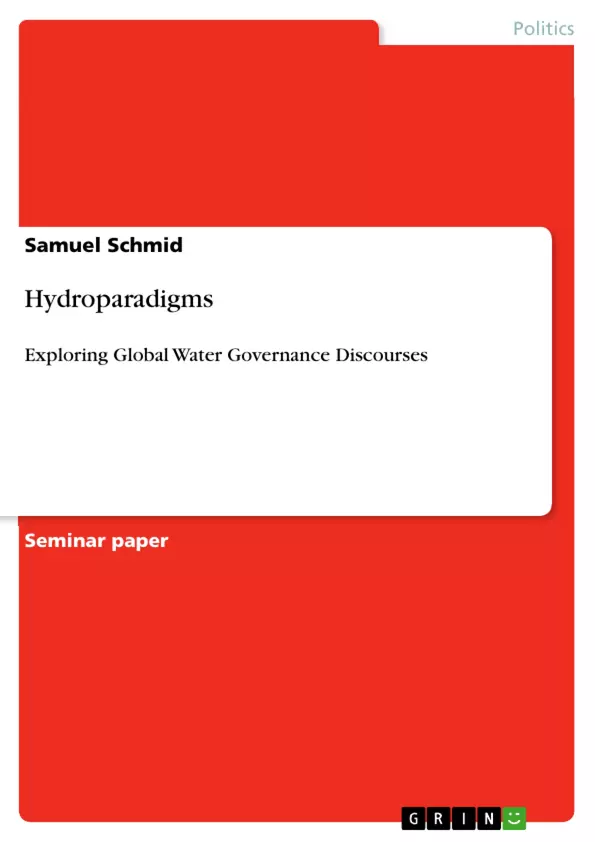This paper discusses the question what kind of Hydroparadigms exist and which dominate the development discourses in Global Water Governance (GWG) in the UN. Theoretically, I draw on non-critical elements of discourse theory as well as a social constructivist framework and concep-tualize Hydroparadigms as the underlying logics and „policy philosophies‟ as to how to solve or mitigate the global water crisis. I argue that the actors in GWG are driven by such paradigms, which are central not only to problem perceptions and policy proposals, but also for eventual re-gime formation. Then, based on a literature review, I deduct a typology system, proposing a three-dimensional map of Hydroparadigms ideal types, each with their specific problem definition, values, norms, policy implications and varying concepts of sustainability. The subsequent dis-course analysis is guided by a pragmatic approach, seeing the method as a special text-analysis that is not so theory-laden. Offering a broad overview of UN actors‟ discourses, I conclude that there are four existing and distinct Hydroparadigms – statist, community-based, economic, and integrated approaches – and that the latter are clearly dominant.
Inhaltsverzeichnis (Table of Contents)
- Introduction
- Theoretical Part: Concepts and Typologies
- The Importance of Ideas, Paradigms and Discourses
- On the Analysis of Discourses
- Theories and Concepts: A Clarification of Perspective
- Towards a Typology of Hydroparadigms in GWG
- Global Water Governance: A Definition
- Existing Typologies of Hydroparadigms in GWG
- Typologies of Goods
- Categorizing Hydroparadigms: A Literature Review
- Dimensions of Hydroparadigms
- A Derived Typology Proposal
- Is there a Paradigm Shift?
- The Importance of Ideas, Paradigms and Discourses
- Research Design: Refining the Approach
- Empirical Part: Hydroparadigms Explored
- Actors, Conferences and Structures in GWG
- Document Selection and Classification
- Results
- Conclusions
- References
- Primary Sources
- Secondary Sources
Zielsetzung und Themenschwerpunkte (Objectives and Key Themes)
This paper aims to identify and analyze the different Hydroparadigms that influence Global Water Governance (GWG) within the United Nations (UN). It explores how these paradigms shape problem perceptions, policy proposals, and regime formation. The paper utilizes a social constructivist framework and discourse theory to understand the underlying logics and 'policy philosophies' driving GWG actors.
- The role of ideas and paradigms in shaping global water governance
- A typology of Hydroparadigms, including their problem definitions, values, norms, and policy implications
- The dominance of specific Hydroparadigms in UN discourses on GWG
- The relationship between Hydroparadigms and sustainability
- The influence of competing Hydroparadigms on regime formation in GWG
Zusammenfassung der Kapitel (Chapter Summaries)
The introduction highlights the global water crisis and its implications for human development. It emphasizes the growing role of GWG actors and structures in addressing this challenge. The chapter introduces the central research question: what Hydroparadigms exist and which dominate the discourses on GWG?
The theoretical part delves into the significance of ideas and paradigms in shaping social reality and political processes. It clarifies the concept of discourse analysis and introduces Hydroparadigms as the underlying ideational packages driving GWG.
The chapter on "Towards a Typology of Hydroparadigms in GWG" examines existing typologies and develops a three-dimensional map of Hydroparadigms ideal types, each with its unique characteristics. It explores the potential for a paradigm shift in GWG.
The research design chapter outlines the methodology employed in the paper, focusing on a pragmatic approach to discourse analysis. It highlights the selection of UN actors and documents as the primary units of analysis.
The empirical part delves into the actors, conferences, and structures involved in GWG. It describes the process of document selection and classification, laying the groundwork for the discourse analysis.
Schlüsselwörter (Keywords)
This paper focuses on Hydroparadigms, Global Water Governance (GWG), discourse analysis, social constructivism, problem definition, policy proposals, regime formation, sustainability, and the UN. It examines the role of competing ideas and paradigms in shaping the global water governance agenda.
Frequently Asked Questions
What are "Hydroparadigms"?
Hydroparadigms are underlying logics or policy philosophies that define how to perceive and solve the global water crisis within global governance.
Which four Hydroparadigms are identified in the UN discourse?
The study identifies statist, community-based, economic, and integrated approaches as the four distinct paradigms in Global Water Governance (GWG).
Which Hydroparadigm is currently dominant in the UN?
The analysis concludes that integrated approaches are clearly dominant in current UN development discourses.
How do paradigms influence policy proposals?
Paradigms shape problem definitions, values, and norms, which in turn dictate which policy implications and concepts of sustainability are proposed.
What theoretical framework is used in this paper?
The paper draws on social constructivism and non-critical elements of discourse theory to analyze how actors are driven by these paradigms.
- Quote paper
- Samuel Schmid (Author), 2010, Hydroparadigms, Munich, GRIN Verlag, https://www.grin.com/document/159193



